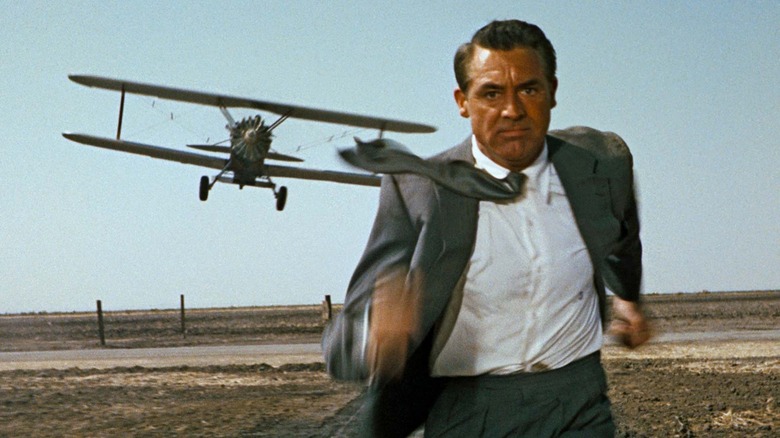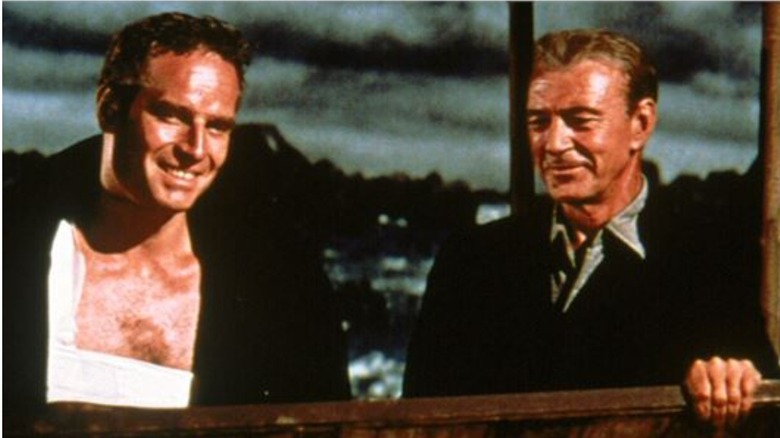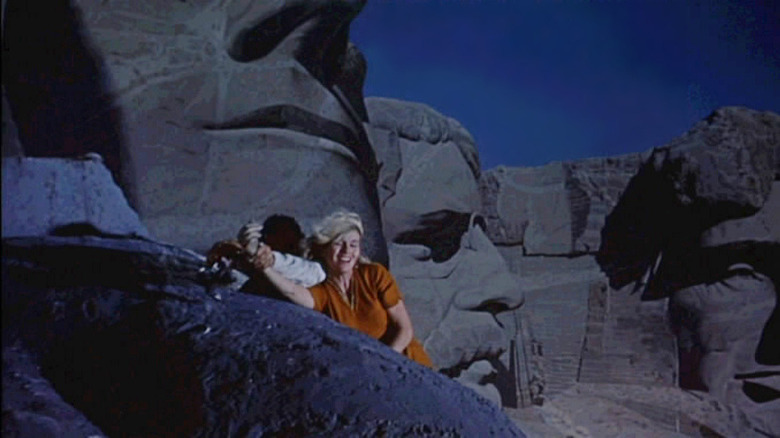It Took Some Trickery From Alfred Hitchcock To Get North By Northwest Made
Many of Alfred Hitchcock's most famous films were adapted from literature, either beginning as novels ("Psycho," as first written by Robert Bloch) or short stories ("Rear Window" was based on Cornell Woolrich's "It Has To Be Murder.") Proving that the book isn't always better than the movie, Hitchcock's adaptations have weathered the test of time much better than their source material.
However, one of the director's foremost classics was also an original: "North By Northwest." Plotted by Hitchcock in collaboration with screenwriter Ernest Lehman, "North by Northwest" is the director at his most unfiltered. It has an ordinary man swept up in intrigue, a seductive blonde, globe-trotting, a MacGuffin, suspense galore, and it's all led by Cary Grant (one of Hitchcock's go-to leading men alongside Jimmy Stewart). "North by Northwest" was successful in its time and is still beloved today, but Hitchcock and Lehman had to be a bit underhanded in order to even get the film made.
Hitchcock and Lehman v. MGM
"North By Northwest" is the only film that Hitchcock made for Metro Goldwyn-Meyer. Throughout the 1950s, most of his output was made with Paramount or Warner Brothers, while after "Psycho" he would only ever make movies for Universal.
The film that MGM originally wanted Hitchcock to make wasn't "North By Northwest." Rather, the studio wanted him to direct an adaptation of "The Wreck of the Mary Deare," about a salvage ship who discovers a mysterious boat adrift. Hitchcock's go-to composer Bernard Herrmann had previously introduced the director to Lehman, and it was Hitchcock who brought Lehman on as screenwriter. Once director and writer got to work, they struggled. As Hitchcok would tell Francois Truffaut for the latter's famous "Hitchcock/Truffaut" book:
"You have a beautiful setup in that mystery ship with a single man on board. But as soon as you go into the explanations, the whole thing becomes very trite... When you're involved in a project and you see it isn't going to work out, the wisest thing is to simply throw the whole thing away."
Hitchcock stalled MGM executives with a version of the truth. In a 2000 interview with the "Creative Screenwriting" journal, Lehman recounted:
"[Hitchcock] went to a meeting and told them that it was taking too long to write 'Mary Deare,' and that we were planning to do another script instead. The studio people, who apparently assumed that Hitch was now planning to do two pictures for the studio, were delighted. Then he glanced down at his wristwatch, said he had to go — because we didn't really have a story at that point — and left. And that was that."
"Mary Deare" ultimately did make it to theaters, directed by Michael Anderson, written by Eric Ambler, and starring Gary Cooper and Charlton Heston, but it didn't the same acclaim as "Northwest." Would that be the case if Hitchcock had directed? We'll never know.
Plotting the film
The premise of "North by Northwest," of an ordinary man mistaken for a fictitious spy, came not from Hitchcock or Lehman but journalist Otis L. Guernsey. According to "A Companion To Alfred Hitchcock," edited by Thomas Leitch and Leland Poague, Guernsey pitched the idea to Hitchcock in 1951; the director, for whom "mistaken identity" was a pet theme, bought the idea and kept it in his back pocket. He finally got to use it when he found himself in need of a story for himself and Lehman.
The "North by Northwest" script was reverse engineered around set-pieces ideas, particularly the climax atop Mount Rushmore. Not all the envisioned set-pieces made into the final cut; alternate destinations for Thornhill that Hitchcock and Lehman considered were Yankee stadium, a Detroit auto factory, and an Alaskan missile base. Another element that took a while to nail down was the title: "In A Northwest Direction," "Breathless," and "The Man In Lincoln's Nose" were thrown around before the final title was decided.
In another snub against MGM, Hitchcock cast not a single one of the studio's contracted stars in the film. He chose Grant and Saint in place of in place of MGM's suggestions of Gregory Peck and Cyd Charisse. This was for the best; it's hard to picture Atticus Finch pulling off the comic befuddlement of Thornhill like Grant does. As for Charisse, Hitchcock would never go for a brunette when there was a blonde available.
Given the switcheroo that Hitchcock pulled on MGM, it's not surprising the studio never worked with him again. At least we got a classic out of their single collaboration.


